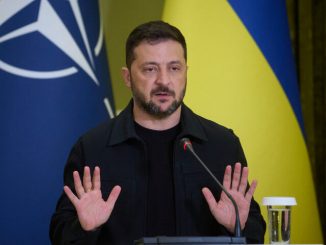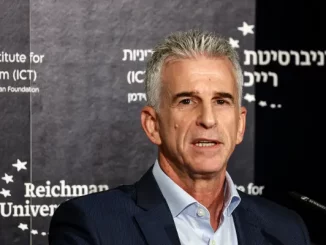
| Published May 4, 2024
Ukrainian President Volodymyr Zelensky has dismissed Russia’s proposed three-day ceasefire for May 8–10, 2025, coinciding with Moscow’s Victory Day celebrations, as a “theatrical production” lacking genuine intent for peace. Instead, Zelensky has called for a comprehensive 30-day unconditional truce, emphasizing that short-term pauses are insufficient for meaningful negotiations .
In response, the Kremlin has expressed frustration over Ukraine’s rejection of the ceasefire, labeling Zelensky’s remarks as a direct threat to visiting foreign dignitaries attending the Victory Day parade. Russian Foreign Ministry spokeswoman Maria Zakharova stated that Zelensky’s comments indicated a “direct threat,” while Deputy Chairman of the Russian Security Council, Dmitry Medvedev, warned that Kyiv’s safety could not be guaranteed if Ukraine attacks Moscow during the celebrations .
The situation remains tense, with ongoing military actions and diplomatic standoffs, as both nations continue to navigate the complexities of the conflict.
The implications of Ukrainian President Volodymyr Zelensky’s refusal to accept Russia’s proposed ceasefire during Moscow’s Victory Day celebrations are significant and multifaceted. Here are the key implications:
1. Heightened Tensions Between Ukraine and Russia
-
Diplomatic Standoff: Zelensky’s dismissal of Russia’s ceasefire offer as a “theatrical production” deepens the diplomatic rift between the two countries. Russia, frustrated by Ukraine’s rejection, may view this as a lack of willingness to engage in meaningful peace talks, leading to further escalation.
-
Military Consequences: With Ukraine rejecting the offer, military actions on both sides are expected to continue without pause, increasing the potential for casualties and damage in an already intense conflict.
2. Impact on International Relations
-
World Leaders at Risk: Russia has signaled that Zelensky’s stance may pose a direct threat to foreign dignitaries visiting Moscow for the Victory Day celebrations, which could escalate security concerns not only for Russian leaders but also for visiting officials, potentially impacting international relations.
-
Diplomatic Fallout: By rejecting the ceasefire, Zelensky is signaling to the international community that Ukraine is unwilling to accept short-term deals that don’t align with its long-term goals. This could influence global leaders’ stances on the conflict, either pushing them to side more decisively with Ukraine or leading to further divisions.
3. Ukraine’s Position on Peace Talks
-
Advocating for a Long-Term Truce: Zelensky’s preference for a 30-day unconditional truce rather than a short-term ceasefire highlights Ukraine’s desire for a more sustainable peace process. This stance may place additional pressure on Russia to engage in more serious peace negotiations, although it could also harden Russia’s resolve to win the war.
-
Ukrainian Public Opinion: The Ukrainian public, which has largely supported the resistance against Russian aggression, might view Zelensky’s refusal as a sign of steadfast leadership, but it could also lead to growing war fatigue if peace seems elusive.
4. Potential for Escalation
-
Risk of Military Escalation: If Russia interprets Ukraine’s rejection as a provocative act, it could lead to a more aggressive military response, especially on symbolic dates like Victory Day. Statements by Russian officials, including Dmitry Medvedev, warning about the safety of Kyiv, indicate the potential for retaliatory actions aimed at sending a message to Ukraine and the world.
-
Wider Regional Impact: The ongoing refusal to engage in peace talks or ceasefires could set the stage for a prolonged conflict that further destabilizes the region, affecting neighboring countries and broader European security.
5. Russian Domestic Implications
-
Kremlin’s Political Narrative: The rejection of the ceasefire offer plays into Russia’s narrative that Ukraine is not interested in peace, which could be used domestically to justify continued military operations. Russian officials may exploit this to rally domestic support for the war, positioning Ukraine as the aggressor.
-
Victory Day Symbolism: With Russia preparing for Victory Day celebrations, the rejection of a ceasefire during such a significant event could be used as a symbolic point in the broader context of the war’s justification, adding a layer of propaganda to the conflict.
Overall Takeaway:
Zelensky’s refusal of Russia’s proposed ceasefire offer is that it underscores Ukraine’s commitment to pursuing a long-term, unconditional peace agreement rather than accepting temporary or symbolic pauses in hostilities. This decision highlights Ukraine’s desire to retain control over the terms of any potential negotiations and ensures that Russia does not use a short-term truce as a tactical advantage.
On a broader scale, this move may deepen the geopolitical divide between Ukraine and Russia, escalate military actions, and put diplomatic relations under further strain. While it positions Ukraine as resolute in its resistance, it could also perpetuate the war, raising the stakes for both sides and international actors involved. The rejection also signals to the world that Ukraine is not interested in fleeting gestures but in a meaningful, lasting peace, which may have long-term implications for the conflict’s resolution and for global security dynamics.
SOURCES: ZEROHEDGE – Zelensky’s Truce Refusal Poses Direct Threat To Visiting Leaders For Victory Day: Kremlin
ARAB NEWS – Zelensky says won’t play Putin ‘games’ with short truce
BLITZ – Zelensky warns world leaders ahead of Moscow’s Victory Day, rejects Russian ceasefire offer
REUTERS – Russia’s Medvedev says nobody can guarantee Kyiv’s safety if Ukraine attacks Moscow on May 9





Be the first to comment